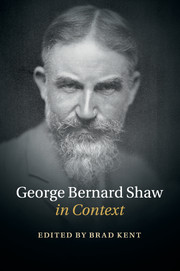Book contents
- Frontmatter
- Dedication
- Contents
- List of illustrations
- Notes on contributors
- Preface
- Acknowledgements
- A Chronology of Shaw's Works
- List of abbreviations
- PART I PEOPLE AND PLACES
- PART II THEATRE
- PART III WRITING AND THE ARTS
- PART IV POLITICS
- PART V CULTURE AND SOCIETY
- PART VI RECEPTION AND AFTERLIFE
- Further reading
- Index
Preface
Published online by Cambridge University Press: 05 October 2015
- Frontmatter
- Dedication
- Contents
- List of illustrations
- Notes on contributors
- Preface
- Acknowledgements
- A Chronology of Shaw's Works
- List of abbreviations
- PART I PEOPLE AND PLACES
- PART II THEATRE
- PART III WRITING AND THE ARTS
- PART IV POLITICS
- PART V CULTURE AND SOCIETY
- PART VI RECEPTION AND AFTERLIFE
- Further reading
- Index
Summary
Unlike for some writers of the modern period, scholars need not be defensive about reading Bernard Shaw in context, nor suggest that doing so presents a radical departure in scholarship. As countless studies and biographies of Shaw attest, he is the consummate subject to be read in context. His writing was not only informed by many of the popular modes, genres, and trends of his day – from melodrama and farce to the New Drama, from the Victorian novel to the New Journalism – but also bent them into idiosyncratic forms. ‘Make It New!’ commanded Ezra Pound. But Pound was coming rather late to the party: Shaw and his colleagues had already been making it new for decades.
From the time in 1876 that he quit the provincial backwater that was his native Dublin for the lures of London – the capital of the all-powerful British Empire enjoying perhaps its most dynamic century – Shaw sought to be in the thick of things and of the moment in which he lived. He first made his name as a reviewer of art, music, and theatre, using his columns not merely to comment on culture and society, but to mould public tastes and to forge his identity. In tandem, he circulated in almost every fashionable, avant-garde, and radical organisation, movement, and body of thought there was, from the Fabian Society to the Stage Society, from vegetarianism and evolutionary theory to feminism and continental philosophy. Not happy to take a back or passenger seat to history, he often imposed himself in many of these arenas, becoming a key player by lecturing and pamphleteering on their behalves and, almost inevitably, coming into conflict with many like-minded individuals and friends.
In addition to his perennial writing and lecturing, Shaw held public office as a vestryman and councillor in the Borough of St Pancras from 1897 to 1903 and was active on a wide range of policies that would affect the lives of his fellow citizens. In his travels, socialising, political work, and writing, he enjoyed relationships with luminaries in several fields and attracted the admiration of individuals who would transform the world in significant ways: Albert Einstein, W. B. Yeats, Bertolt Brecht, Oscar Wilde, Gene Tunney, Auguste Rodin, Charlie Chaplin, Emmeline Pankhurst, Winston Churchill, Adolf Hitler, Vladimir Lenin, and Jawaharlal Nehru, to name a small but revealing sampling.
- Type
- Chapter
- Information
- George Bernard Shaw in Context , pp. xxiii - xxviPublisher: Cambridge University PressPrint publication year: 2015



